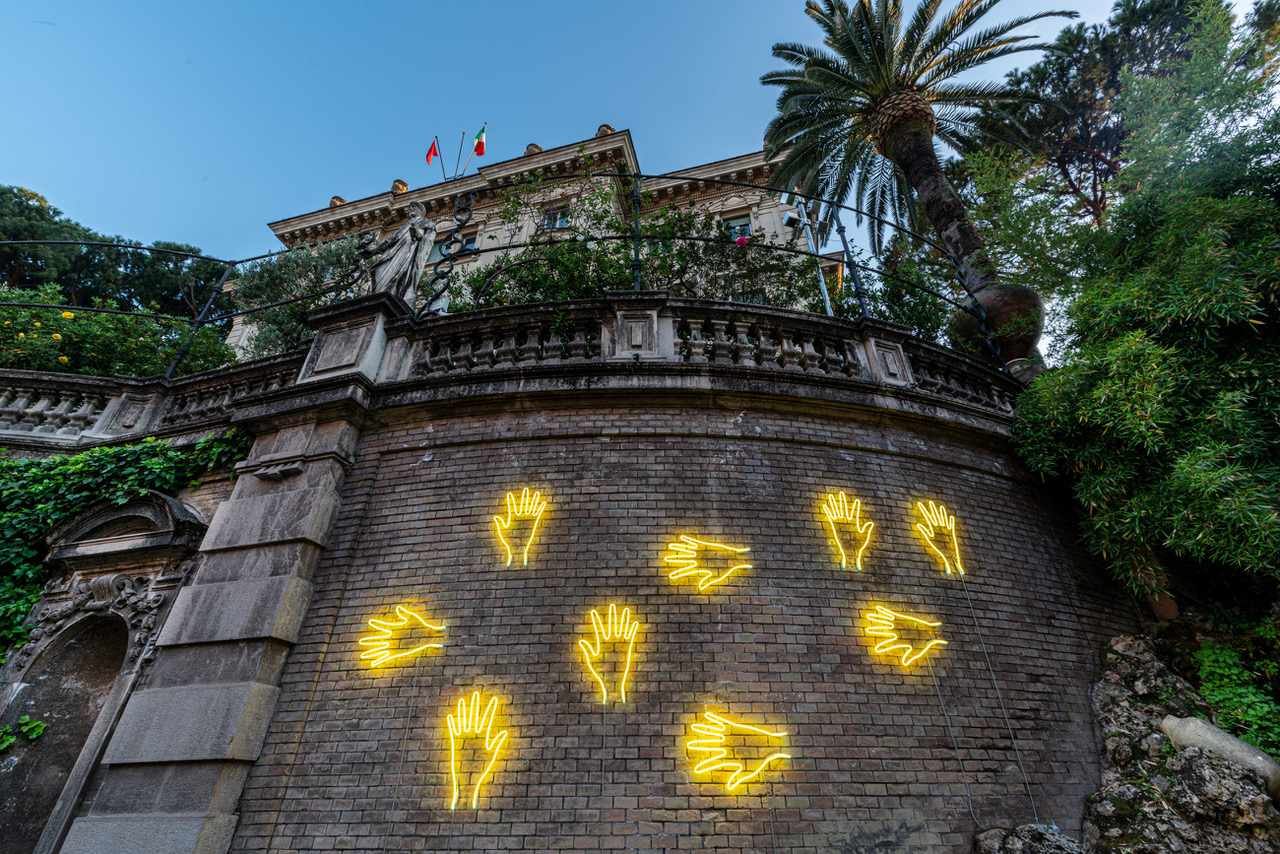Neon installation
Neon by Mai-Thu Perret on the entrance wall of Istituto Svizzero
Neon by Mai-Thu Perret on the entrance wall of Istituto Svizzero
Istituto Svizzero presents a new semi-permanent work at the entrance of Villa Maraini. The work consists of a newly commissioned neon installation by Swiss artist Mai-Thu Perret (b. 1976, Geneva). The piece lights the building and is visible for passersby on Via Ludovisi.
Untitled (2021) consists of nine hands, made of yellow glowing neon tubes. It almost seems as if they want to climb the brick wall in the entrance area of Villa Maraini, or perhaps climb out. Franz Kafka’s aphorism « A cage went in search of a bird », noted in 1917, is important for Mai-Thu Perret in the development of the neon work. Thus, the question of the balance between cage and bird, the contradiction between freedom and protective loss of freedom. Mai-Thu Perret’s artistic practice is based on profound research and draws on references from cultural history, literary texts, feminist narratives, avant-garde aesthetics, and craft traditions. The neon work Untitled follows on from research on the hand, on hands, which Mai-Thu Perret has been pursuing for some time now.
She is interested in the hand as an almost original pictorial motif – Stone Age cave paintings show not only animals or hunting scenes, but also handprints or hand negatives that, according to anthropological evidence, originated from women.
At the same time, Mai-Thu Perret also deals with the hand as an important symbol in Tantra, the Indian philosophy from the 2nd century – for example in the hand painted on wood in the work Untitled from 2006 – or ties her reflections on the knowledge, the memory inscribed in the body to the image of the hand. At the same time, the hand can still be read not only as a symbol for work, but also as a symbol for art-making. Mai-Thu Perret’s neon hands can trigger these and other thoughts.
Mai-Thu Perret’s installation follows a series of neon works previously placed over the walls of Istituto Svizzero, including Pittore in Africa by Mario Merz, exposed between 2019 and 2020, and Miracle, a monumental purple neon realized by Sylvie Fleury, hung above the entrance door from 2016 to 2019.
Biography:
The sculptures, paintings, ceramic works, performances, and texts of Mai-Thu Perret (b. 1976, Geneva) exist at the intersection of contemporary culture, art historical critique, and visceral materiality. She explores (and generates) feminist narratives and counter-narratives that cast the role of the art object in new light, introducing utilitarian, symbolic, and even mystical possibilities in contexts that are often limited to formalist readings. In her encompassing vision, for instance, the development of modernism appears not only as a story about increasing abstraction, but as the outgrowth of biological and neurological patterns that have informed human expression throughout the globe for thousands of years. Perret’s work shows how bodies are always implicit subjects of artistic discourse, and how impulses for utopian transcendence (aesthetic, political, or otherwise) can always be traced back to the physicality of desire.
Mai-Thu Perret has been the subject of solo exhibitions at Badischer Kunstverein, Karlsruhe, Germany (2019); Spike Island, Bristol, England (2019); MAMCO, Geneva (2019); Musée d’art moderne et contemporain, Geneva (2016); Nasher Sculpture Center, Dallas (2016); Le Magasin, Grenoble, France (2012); Haus Konstruktiv, Zurich (2011); University of Michigan Museum of Art, Ann Arbor (2010); San Francisco Museum of Modern Art (2008); and the Renaissance Society at the University of Chicago (2006). Perret’s work is in the permanent collection of institutions worldwide, including the Centre National des Arts Plastiques, Paris; Collection Aargauer Kunsthaus, Aarau; Fond National d’Art Contemporain, Paris; Migros Museum of Contemporary Art, Zurich; San Francisco Museum of Modern Art; and Walker Art Center, Minneapolis. Perret lives and works in Geneva.

Mai-Thu Perret, ‘Untitled’, 2021, neon installation at Istituto Svizzero. Photo by Ela Bialkowska, © Okno Studio
Mai-Thu Perret, ‘Untitled’, 2021, neon installation at Istituto Svizzero. Photo by Ela Bialkowska, © Okno Studio
Mai-Thu Perret, ‘Untitled’, 2021, neon installation at Istituto Svizzero. Photo by Ela Bialkowska, © Okno Studio
Mai-Thu Perret, ‘Untitled’, 2021, neon installation at Istituto Svizzero. Photo by Ela Bialkowska, © Okno Studio
Mai-Thu Perret, ‘Untitled’, 2021, neon installation at Istituto Svizzero. Photo by Ela Bialkowska, © Okno Studio
Mai-Thu Perret, 'Untitled', 2006, acrylic and acrylic gouache on plywood, 45 x 35 x 1,3 cm. © Annik Wetter
Production of Mai-Thu Perret’s neon work 'Untitled' (2021)